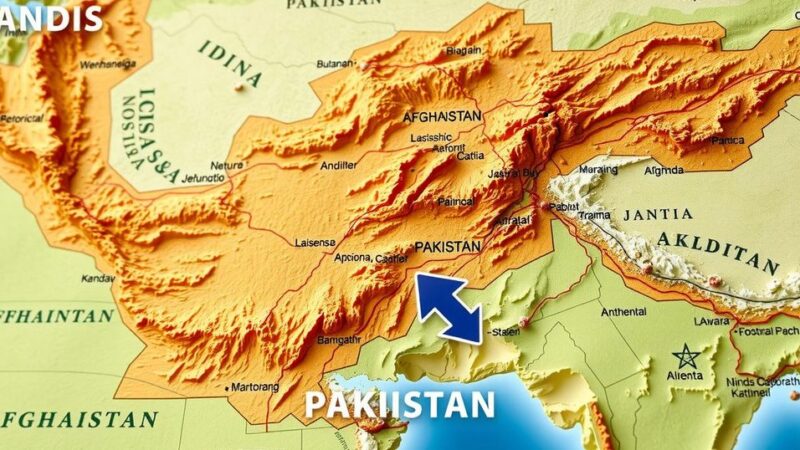President Biden characterized the Israeli airstrike killing Hezbollah’s Hassan Nasrallah as a ‘measure of justice,’ linking it to his prolonged reign of violence and recent escalations in the Middle East. Following the strike, Biden’s administration is navigating responses to prevent wider conflict while simultaneously discussing cease-fires amid the intensifying warfare involving Israel, Hamas, and Hezbollah.
REHOBOTH BEACH, Del. — President Joe Biden referred to the Israeli airstrike that resulted in the death of Hezbollah’s founder Hassan Nasrallah as a “measure of justice,” underscoring the significance of eliminating a leader responsible for a prolonged history of violence. This statement follows Hezbollah’s confirmation that Nasrallah was killed during an airstrike in Beirut the day prior. In his remarks, President Biden framed Nasrallah’s death within the larger context of escalating conflict initiated by Hamas’ attack on Israel on October 7, 2023, stating, “Nasrallah, the next day, made the fateful decision to join hands with Hamas and open what he called a ‘northern front’ against Israel.” Biden highlighted that during Nasrallah’s tenure, Hezbollah has been implicated in the deaths of numerous Americans. The White House perceives Nasrallah’s death as a significant setback for Hezbollah; however, the Biden administration remains cautious in its approach, striving to limit the conflict between Israel and Hamas—both of which are supported by Iran—from escalating into a broader regional war. In an effort to provide clarity, the White House and Pentagon quickly clarified that Israel did not give advance notice of this operation. This development follows a week wherein Biden’s senior national security officials endeavored to facilitate support for a proposed 21-day cease-fire between Israel and Hezbollah, hoping to rekindle stalled discussions for a cease-fire in Gaza. In response to ongoing hostilities, Israeli Prime Minister Benjamin Netanyahu addressed the United Nations to reaffirm that operations against Hezbollah would continue until displaced Israeli citizens could safely return home. On the topic of a cease-fire, President Biden reiterated the urgency of resolving tensions, stating, “It is time for these deals to close, for the threats to Israel to be removed, and for the broader Middle East region to gain greater stability.” In the aftermath of Nasrallah’s death, Iranian President Masoud Pezeshkian condemned the U.S. role in supporting the strike, stating that the world would not forget that “the order of the terrorist strike was issued from New York and the Americans cannot absolve themselves from complicity with the Zionists.” Moreover, in light of the escalating situation in Lebanon, the State Department has ordered the departure of family members of U.S. diplomats who are not stationed at the embassy in Beirut and authorized the voluntary departure of those stationed at the embassy as well as nonessential staff, emphasizing the “volatile and unpredictable security situation.” The State Department has consistently advised Americans against traveling to Lebanon and has reiterated calls for U.S. citizens to consider leaving the country amidst the heightened unrest, citing the risk posed by airstrikes and civil unrest in the region.
The recent airstrike that resulted in the death of Hezbollah leader Hassan Nasrallah represents a pivotal moment in the ongoing conflict between Israel, Hamas, and Hezbollah. Nasrallah has been a significant figure in Middle Eastern politics, known for orchestrating strategies that align with Iranian interests against Israel. The strike has heightened tensions just as President Biden’s administration was attempting to facilitate peace discussions regarding the broader Israeli-Palestinian conflict. Nasrallah’s death is viewed by some as a strategic victory against a long-standing adversary, while others, particularly in Iran, condemn it as an act of aggression facilitated by U.S. support.
The death of Hassan Nasrallah in an Israeli airstrike has sparked reactions from various global leaders, including President Biden, who frames it as a necessary step towards justice. However, this event also raises concerns regarding regional stability and the ongoing Israeli-Palestinian conflict. The Biden administration’s strategy appears to focus on mitigating escalated violence while exploring pathways for cease-fires in both Gaza and Lebanon. The evolving situation demands vigilant observation, as the implications of Nasrallah’s death may reverberate throughout the region and impact diplomatic efforts moving forward.
Original Source: apnews.com







